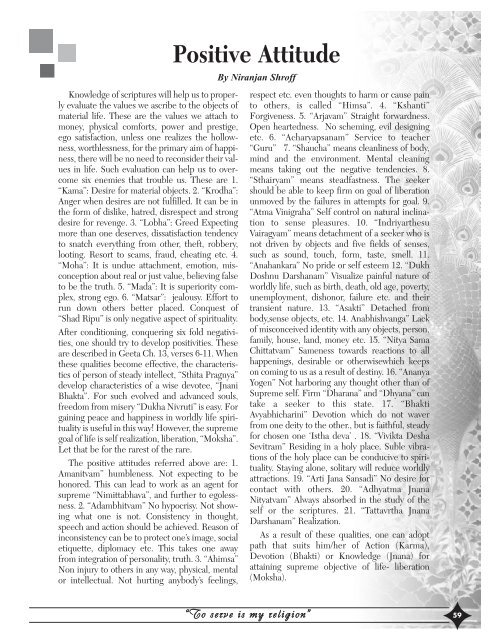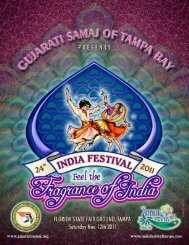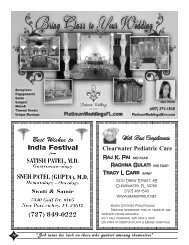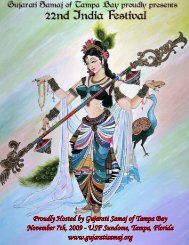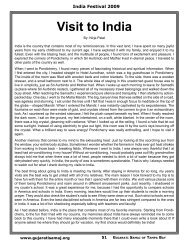Create successful ePaper yourself
Turn your PDF publications into a flip-book with our unique Google optimized e-Paper software.
Knowledge of scriptures will help us to properly<br />
evaluate the values we ascribe to the objects of<br />
material life. These are the values we attach to<br />
money, physical comforts, power and prestige,<br />
ego satisfaction, unless one realizes the hollowness,<br />
worthlessness, for the primary aim of happiness,<br />
there will be no need to reconsider their values<br />
in life. Such evaluation can help us to overcome<br />
six enemies that trouble us. These are 1.<br />
“Kama”: Desire for material objects. 2. “Krodha”:<br />
Anger when desires are not fulfilled. It can be in<br />
the form of dislike, hatred, disrespect and strong<br />
desire for revenge. 3. “Lobha”: Greed Expecting<br />
more than one deserves, dissatisfaction tendency<br />
to snatch everything from other, theft, robbery,<br />
looting. Resort to scams, fraud, cheating etc. 4.<br />
“Moha”: It is undue attachment, emotion, misconception<br />
about real or just value, believing false<br />
to be the truth. 5. “Mada”: It is superiority complex,<br />
strong ego. 6. “Matsar”: jealousy. Effort to<br />
run down others better placed. Conquest of<br />
“Shad Ripu” is only negative aspect of spirituality.<br />
After conditioning, conquering six fold negativities,<br />
one should try to develop positivities. These<br />
are described in Geeta Ch. 13, verses 6-11. When<br />
these qualities become effective, the characteristics<br />
of person of steady intellect, “Sthita Pragnya”<br />
develop characteristics of a wise devotee, “Jnani<br />
Bhakta”. For such evolved and advanced souls,<br />
freedom from misery “Dukha Nivruti” is easy. For<br />
gaining peace and happiness in worldly life spirituality<br />
is useful in this way! However, the supreme<br />
goal of life is self realization, liberation, “Moksha”.<br />
Let that be for the rarest of the rare.<br />
The positive attitudes referred above are: 1.<br />
Amanitvam” humbleness. Not expecting to be<br />
honored. This can lead to work as an agent for<br />
supreme “Nimittabhava”, and further to egolessness.<br />
2. “Adambhitvam” No hypocrisy. Not showing<br />
what one is not. Consistency in thought,<br />
speech and action should be achieved. Reason of<br />
inconsistency can be to protect one’s image, social<br />
etiquette, diplomacy etc. This takes one away<br />
from integration of personality, truth. 3. “Ahimsa”<br />
Non injury to others in any way, physical, mental<br />
or intellectual. Not hurting anybody’s feelings,<br />
Positive Attitude<br />
By Niranjan Shroff<br />
respect etc. even thoughts to harm or cause pain<br />
to others, is called “Himsa”. 4. “Kshanti”<br />
Forgiveness. 5. “Arjavam” Straight forwardness.<br />
Open heartedness. No scheming, evil designing<br />
etc. 6. “Acharyapsanam” Service to teacher<br />
“Guru” 7. “Shaucha” means cleanliness of body,<br />
mind and the environment. Mental cleaning<br />
means taking out the negative tendencies. 8.<br />
“Sthairyam” means steadfastness. The seeker<br />
should be able to keep firm on goal of liberation<br />
unmoved by the failures in attempts for goal. 9.<br />
“Atma Vinigraha” Self control on natural inclination<br />
to sense pleasures. 10. “Indriyarthesu<br />
Vairagyam” means detachment of a seeker who is<br />
not driven by objects and five fields of senses,<br />
such as sound, touch, form, taste, smell. 11.<br />
“Anahankara” No pride or self esteem 12. “Dukh<br />
Doshnu Darshanam” Visualize painful nature of<br />
worldly life, such as birth, death, old age, poverty,<br />
unemployment, dishonor, failure etc. and their<br />
transient nature. 13. “Asakti” Detached from<br />
body,sense objects, etc. 14. Anabhishvanga” Lack<br />
of misconceived identity with any objects, person,<br />
family, house, land, money etc. 15. “Nitya Sama<br />
Chittatvam” Sameness towards reactions to all<br />
happenings, desirable or otherwisewhich keeps<br />
on coming to us as a result of destiny. 16. “Ananya<br />
Yogen” Not harboring any thought other than of<br />
Supreme self. Firm “Dharana” and “Dhyana” can<br />
take a seeker to this state. 17. “Bhakti<br />
Avyabhicharini” Devotion which do not waver<br />
from one deity to the other., but is faithful, steady<br />
for chosen one ‘Istha deva’ . 18. “Vivikta Desha<br />
Sevitram” Residing in a holy place. Suble vibrations<br />
of the holy place can be conducive to spirituality.<br />
Staying alone, solitary will reduce worldly<br />
attractions. 19. “Arti Jana Sansadi” No desire for<br />
contact with others. 20. “Adhyatma Jnana<br />
Nityatvam” Always absorbed in the study of the<br />
self or the scriptures. 21. “Tattavrtha Jnana<br />
Darshanam” Realization.<br />
As a result of these qualities, one can adopt<br />
path that suits him/her of Action (Karma),<br />
Devotion (Bhakti) or Knowledge (Jnana) for<br />
attaining supreme objective of life- liberation<br />
(Moksha).<br />
“To serve is my religion” 59


